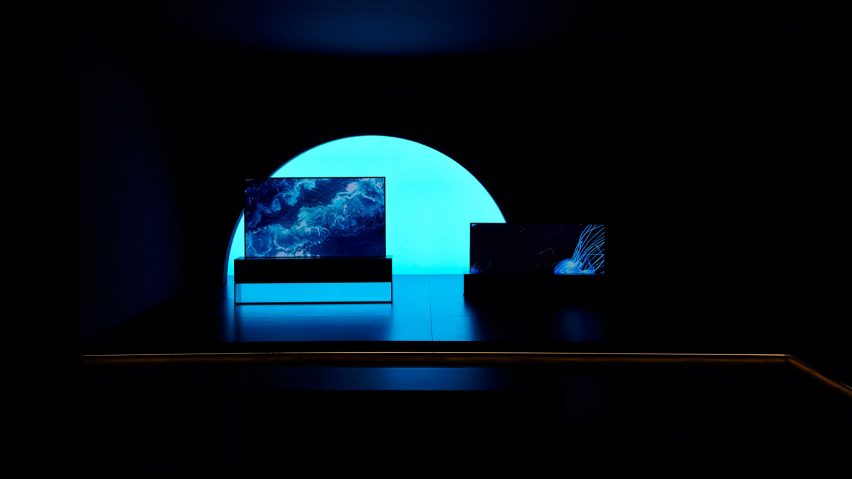Foster + Partners has been revealed as a collaborator on LG's Signature OLED TV R, the world's first television that rolls out of sight.
The two companies announced their partnership at Milan design week, where they showcased the television design in an installation.
British architecture practice Foster + Partners worked on the project through its industrial design arm, and is responsible for the TV's external geometry and finishes. It also worked together with LG to design some of the internal mechanisms.
LG's Signature OLED TV R is notable for its roll-up action, made possible by a flexible screen that is just 0.2 millimetres thick, with a sprung steel backing for support.
When users aren't watching it, they simply push a button to retract the screen into its rectangular aluminium base, which doubles as the speaker and has a matching Kvadrat fabric cover.
The product is one in a wave of televisions designed to disappear or blend into the background when not being watched, but it is the first to use a roll-up mechanism. LG and Foster + Partners position it as "[liberating] users from the limitations of the wall".
The 65-inch 4K TV was first unveiled at the 2019 Consumer Electronics Show (CES) in Las Vegas in January, but Foster + Partners' involvement was kept under wraps until last week.
Mike Holland, head of industrial design at Foster + Partners, said the firm had focused on making an understated product that would fit into a variety of interiors.
"The design is a creative response to the challenge of creating invisible technology that is unobtrusive with a quiet sculptural presence," said Holland.
"It dematerialises the screen, which can be automatically rolled in and out of a discreet minimalist rectangular enclosure when needed, offering a sense of liberation to designing interior spaces."
As an alternative to full extension and full retraction, the television can also be set to "Line View" — a midway option where only the top part of the screen is unrolled to display content such as a clock, photos or home dashboard.
Foster + Partners and LG showcased the product with an installation called Redefining Space at Superstudio Più in the Tortona district of Milan from 9 to 14 April. It combined on-screen content with ambient lighting effects.
It is one of several hide-able televisions to be showcased at Milan. Bang & Olufsen unveiled their sculptural take on the trend, the Beovision Harmony, while Panasonic and Vitra collaborated on the Vitrine prototype, designed to look like a pane of glass.
All of these products are meant to counter the dominating effect that a black screen has in interior environments, particularly living spaces. Samsung has been a major driver in this regard, launching the Bouroullec-designed Serif TV in 2015 followed by Yves Behar's painting-like Frame in 2017 and Ambient Mode in 2018.
While best known for its architecture, the studio of Norman Foster has an active industrial design arm.
Its past designs include the 20-06 Stacking Chair for Emeco that was the subject of a copyright infringement dispute with IKEA in 2016, as well as the minimal Tono bathroom range for Porcelanosa and Eva candle-like light for Lumina.

